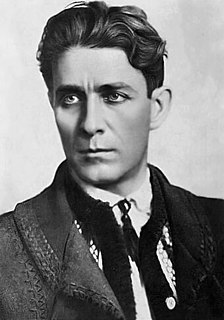A Quote by Stefan Zweig
As one who knows many things, the humanist loves the world precisely because of its manifold nature and the opposing forces in itdo not frighten him. Nothing is further from him than the desire to resolve such conflictsand this is precisely the mark of the humanist spirit: not to evaluate contrasts as hostility but to seek human unity, that superior unity, for all that appears irreconcilable.
Related Quotes
If speculation tends thus to a terrific unity, in which all things are absorbed, action tends directly back to diversity. The first is the course or gravitation of mind; the second is the power of nature. Nature is manifold. The unity absorbs, and melts or reduces. Nature opens and creates. These two principles reappear and interpenetrate all things, all thought; the one, the many.
It is human self-renunciation when a man denies himself and the world opens up to him. But it is Christian self-renunciation when he denies himself and, because the world precisely for this shuts itself up to him, he must as one thrust out by the world seek God's confidence. The double-danger lies precisely in meeting opposition there where he had expected to find support, and he has to turn about twice; whereas the merely human self-resignation turns once.
We must earn the peace we seek just as we earned victory in the war, not by wishful thinking but by realistic effort. At no time in our history has unity among our people been so vital as it is at the present time. Unity of purpose, unity of effort, and unity of spirit are essential to accomplish the task before us.
...Every ego so far from being a unity is in the highest degree a manifold world, a constellated heaven, a chaos of forms, of states and stages, of inheritances and potentialities. It appears to be a necessity as imperative as eating and breathing for everyone to be forced to regard this chaos as a unity and to speak of his ego as though is was a one-fold and clearly detached and fixed phenomenon. Even the best of us shares this delusion.
The big tradition, I think, is unity. And I have that in mind; and with that, you know, you could break all the traditions- all the other so-called rules, because they are stylistic.. and most are not true. As long as the marks are related to one another, there is unity. Unity in the work itself depends on unity of the artist's vision.
Try to comprehend the unity of all; there is one God, and all are one in Him. If we can but bring home to ourselves the unity of that Eternal Love, there will be no more sorrow for us; for we shall realize, not for ourselves alone but for those whom we love, that whether we live or die, we are the Lord's, and that in Him we live and move and have our being, whether it be in this world or in the world to come.
What kind of world does the humanitarian contemplate as affording him full scope? It could only be a world filled with breadlines and hospitals, in which nobody retained the natural power of a human being to help himself or to resist having things done to him. And that is precisely the world that the humanitarian arranges when he gets his way.
When Coleridge tried to define beauty, he returned always to one deep thought; beauty, he said, is unity in variety! Science is nothing else than the search to discover unity in the wild variety of nature,-or, more exactly, in the variety of our experience. Poetry, painting, the arts are the same search, in Coleridge's phrase, for unity in variety.






































